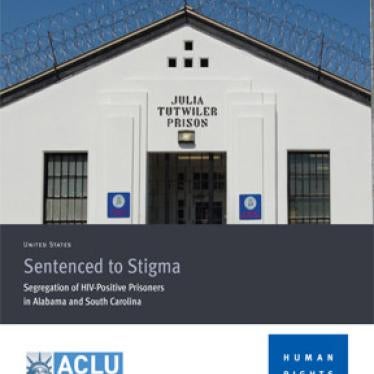A report on HIV-positive prisoners by Human Rights Watch and the American Civil Liberties Union has made waves in Mississippi and South Carolina.
Based on the report, which brought to light the segregation and inferior treatment of HIV-positive prisoners, Mississippi is now working to integrate these people into the prison community and has pledged not to segregate future prisoners. South Carolina has been ordered by the US Justice Department to stop segregating HIV-positive prisoners or face legal consequences.
Because of the segregation policies in these states, inmates can be denied education and work opportunities, forced to wear armbands or other indicators of their positive status, and made to eat and even worship separately. Ending segregation is the first step in reestablishing dignity and rehabilitation opportunities for these prisoners.
Hundreds of HIV-positive people in Mississippi and South Carolina now stand to benefit from being mainstreamed into the prison population.
Lorna P's introduction to prison in South Carolina was an involuntary HIV test. When she tested positive, she was immediately branded an outcast by the other prisoners. Her family learned of her HIV status from other prisoners before she had a chance to tell them.
"You haven't dealt with it, you're still in denial, disbelief, but everybody knows and they call your family and friends," Lorna told Human Rights Watch. "You get letters from your people saying ‘We heard you're dying of AIDS.'"
Lorna was later denied access to work programs intended to help prisoners transition back into society because of her positive status.
In South Carolina and Alabama, prisoners have marked badges or wear colored armbands to distinguish their HIV-positive status, and they must sit separately in the eating hall and chapel. One prisoner described being pulled from a crowded room when he tested positive for HIV. He was locked up isolation for 23 hours a day and had his meals pushed through a vent in the door.
"It's government-sponsored stigma," said researcher Megan McLemore, who spent a number of months researching the report, her third on HIV in US prisons. "Some of these people are coming out in ninety days or one or two years. And what do they come out to? A family traumatized, limited job prospects, and they are branded as being HIV-positive, which can have a huge impact on their return to the community."
In Mississippi, Human Rights Watch and the American Civil Liberties Union met with state prison authorities, including Christopher Epps, the corrections commissioner. After discussing the report's findings, Epps announced that he was prepared to end HIV-based segregation.
South Carolina and Alabama are now the last two states in the US to isolate HIV-positive people from the general prison population. Human Rights Watch will continue to work with South Carolina to ensure its compliance with the US Justice Department's demands. We are also working with the Justice Department to urge it to make similar demands of Alabama. We are working with state legislators in all three states-Mississippi, South Carolina, and Alabama-to achieve the goals of good medical care and reduced HIV transmission so that people like Lorna are no longer forced to forfeit their human rights.







